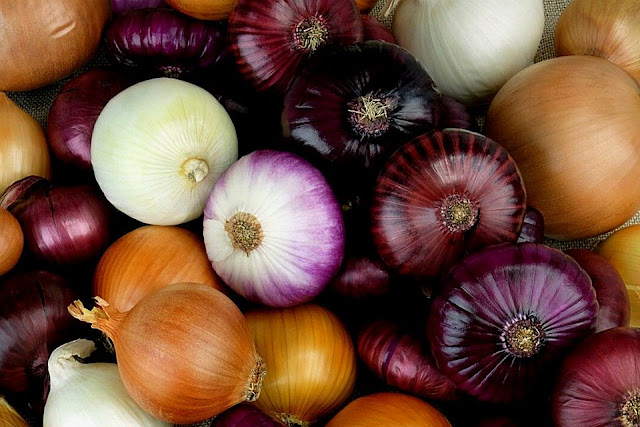Onions were historically as a preventative medicine during epidemics of cholera and the plague. They were apparently eaten by Roman emperor Nero as a cure for colds, and its reputation has made onions a popular component in the diets of many countries.
Onions differ in the size, colour and taste. Spring onions are grown in warmer climates and have a milder, sweeter taste. Storage onions are grown in colder weather climates and generally have a more pungent flavour and are usually named by their colour: white, yellow or red. Smaller onions come in many types, such as chives, leeks and shallots.
--- The total polyphenol content of onions is much higher than many people expect. (Polyphenols are one of the largest categories of phytonutrients in food. This category includes all flavonoids as well as tannins.) The total polyphenol content of onion is not only higher than its fellow allium vegetables, garlic and leeks, but also higher than tomatoes, carrots, and red bell pepper.
--- The quercetin in onions may also help prevent plaque buildup in the arteries, which reduces the risk of heart attack and stroke, according to the University of Maryland Medical Center. But since most of the studies in this regard have focused on animals, more research is needed to understand the effects in humans.
--- The fiber in onions promotes good digestion and helps keep you regular. Additionally, onions contain a special type of soluble fiber called oligofructose, which promotes good bacteria growth in your intestines. One 2005 study in Clinical Gastroenterology and Hepatology found that oligofructose may help prevent and treat types of diarrhea. The phytochemicals in onions that scavenge free radicals may also reduce your risk of developing gastric ulcers, according to the National Onion Association.
The humble onion is found in every kitchen, but its curative powers make it an important medicinal plant too. Like garlic, it is a member of the lily family. There can be no doubting the power of the juices contained in onions; anyone who has ever sliced one and shed a tear is only too aware that they hold something special. Quite apart from its medicinal properties the onion is simply delicious. It forms the basis of so many dishes - whether raw, sautéed, baked, steamed or boiled, that it would be difficult to imagine the cuisine of any country without it.



No comments:
Post a Comment